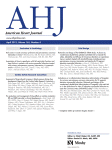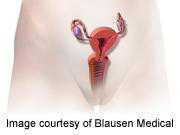AHJ:子宫切除术并不增加心脏病风险
2013-05-17 牡丹 译 医学论坛网
与一些早期研究相反,一项新的美国研究发现中年女性进行子宫切除术(伴或不伴卵巢切除)后,罹患心血管疾病的风险并未上升。这些女性罹患心血管病的风险并不高于自然绝经的女性,该新研究说。 匹兹堡大学首席作家Karen A. Matthews及同事在一份报告中写下了他们的发现,这份报告计划于本周在线发布于《美国心脏病学会杂志》。 Matthews,匹兹堡的一位杰出的精神病
与一些早期研究相反,一项新的美国研究发现中年女性进行子宫切除术(伴或不伴卵巢切除)后,罹患心血管疾病的风险并未上升。这些女性罹患心血管病的风险并不高于自然绝经的女性,该新研究说。
匹兹堡大学首席作家Karen A. Matthews及同事在一份报告中写下了他们的发现,这份报告计划于本周在线发布于《美国心脏病学会杂志》。
Matthews,匹兹堡的一位杰出的精神病学教授和流行病学与心理学教授,在一份新闻公报中声明,这些结果对正在考虑子宫切除术的中年女性来说应该是鼓舞人心的:
“研究结果表明,相对于自然绝经后,子宫切除术后的心血管病风险因子水平不大可能上升,”Matthews说。
子宫切除术与心血管病风险
子宫切除术是一种常见的移除女性子宫的手术操作。有时,病人还移除卵巢,以降低卵巢癌风险。
有时可能明显需要进行该操作,比如因为癌症、子宫下垂、纤维样肌瘤,或因为非常重的月经过多与痛经,但与此同时,和所有手术一样,仍要权衡其收益与风险。
因为荷尔蒙改变,在绝经前进行子宫切除术常导致更年期提前。
一些早期研究表明子宫切除术提高罹患心血管疾病的长期风险,而心血管疾病是女性头号杀手。而且他们推断,如果同时切除卵巢,该风险将更高。
但是该见解有缺陷,主要因为这些研究倾向于评估子宫切除术与/或卵巢切除术多年之后的心血管病风险,而没有将她们在手术之前就可能有的风险考虑进去。
研究者们做了什么
而在该项新研究中,Matthews及其同事随访了3,302位美国绝经前女性11年。这些女性参加了全国女性研究(SWAN)。
研究伊始,当这些女性加入到SWAN时,她们42-52岁,子宫完整,有至少1个卵巢,且没有使用激素疗法。
在随访期间,每年给她们做评估。在此期间,大部分女性达到自然绝经年龄,一些进行了子宫切除术伴卵巢切除术,而一些则不伴卵巢切除术。
进行子宫切除术的主要原因是纤维样肌瘤、月经过多和慢性骨盆痛。
研究者在子宫切除术前后评估了参与者的心血管病风险,并将这些数据与那些自然绝经的女性最后一次月经前后的风险相比。
Matthews及其同事说,他们的研究是首项多民族研究,跟踪了进行子宫切除术与自然绝经的女性的心血管病风险因子的每年预期改变。
发现了什么
该分析显示子宫切除术前后与自然绝经前后心血管风险因子发生变化,在不同个体,子宫切除术者与自然绝经者变化模式大不相同;同时,总体变化模式显示子宫切除术者心血管风险并未上升,研究者们说。并且,此情况在所有种族组都一样。
并且,即使在调整可能的影响因子——比如人体质量指数(BMI)——之后,情况仍一样。子宫切除术伴卵巢切除术后,BMI确实有所上升。
原因是什么
Mathews说他们并不确定为什么他们的发现与显示子宫切除术升高心血管病风险的早期研究不同。
一个原因可能是,他们没有将年轻女性纳入研究,而更早进行子宫切除术导致的心血管病风险更高。
另一个原因,Matthews说,可能是因为该研究排除了因为癌症而进行子宫切除术的女性。
SWAN由国家老年医学研究所、国立护理研究所、国立卫生研究院、女性健康研究室和补充与替代医学中心共同发起。
2011年,《内科学档案》杂志写道,来自旧金山加利福尼亚大学的研究者们报道,他们发现进行了子宫切除术伴卵巢切除术的女性发生卵巢癌的风险降低,并且发生其它类型癌症、心脏病或髋骨折的风险并未升高。
与子宫切除相关的拓展阅读:

原文阅读:Hysterectomy does not increase risk of cardiovascular disease
Positive findings differ from previous studies on hysterectomy, heart disease risk
Having a hysterectomy with or without ovary removal in mid-life does not increase a woman's risk of cardiovascular disease compared to women who reach natural menopause, contrary to many previously reported studies, according to research published online today in the Journal of the American College of Cardiology.
"Middle-aged women who are considering hysterectomy should be encouraged because our results suggest that increased levels of cardiovascular risk factors are not any more likely after hysterectomy relative to after natural menopause," said Karen A. Matthews, PhD, lead author of the study and a distinguished professor of psychiatry and professor of epidemiology and psychology at the University of Pittsburgh.
Hysterectomy is the surgical removal of a woman's uterus; it is sometimes accompanied by the removal of the ovaries to decrease the risk of ovarian cancer. Hysterectomy is a common surgical procedure for women, but the benefits must be weighed against potential long-term related health consequences. Cardiovascular disease is the number one killer of women and many studies have shown increased risk of cardiovascular disease to be a health risk associated with hysterectomy, especially accompanied by ovary removal. Researchers in those studies usually evaluated cardiovascular disease risk factors years after hysterectomy and/or ovary removal and did not assess individual risk factor levels pre-surgery.
For this study, investigators followed 3,302 premenopausal women between the ages of 42-52 for 11 years who were enrolled in the Study of Women's Health across the Nation (SWAN). Researchers compared cardiovascular disease risk factors in women prior to and following elective hysterectomy with or without ovary removal to the risk factors prior to and following final menstrual period in women who underwent natural menopause.
This is the only multiethnic study that has tracked prospective annual changes in cardiovascular disease risk factors relative to hysterectomy or natural menopause.
Investigators found that several cardiovascular disease risk factor changes differed prior to and following hysterectomy, compared to changes prior to and following a natural menopause, but those changes did not suggest an increased cardiovascular disease risk following hysterectomy, independent of body mass index, which did increase after hysterectomy with removal of ovaries. These effects were similar in all ethnic groups in the study.
Dr. Matthews said it is unclear why this study's findings differed from other studies exploring hysterectomy and cardiovascular risk, but likely factors include the age of participants since hysterectomy that occurs earlier in life may present more cardiovascular risk. Also, earlier studies included women who had hysterectomy for any reason, whereas the SWAN study excluded women who had hysterectomy because of cancers.
"This study will prove very reassuring to women who have undergone hysterectomy," said American College of Cardiology CardioSmart Chief Medical Expert JoAnne Foody, MD, FACC. "As with anything, if a woman is concerned about her risk for heart disease she should discuss this with her health care provider."
本网站所有内容来源注明为“梅斯医学”或“MedSci原创”的文字、图片和音视频资料,版权均属于梅斯医学所有。非经授权,任何媒体、网站或个人不得转载,授权转载时须注明来源为“梅斯医学”。其它来源的文章系转载文章,或“梅斯号”自媒体发布的文章,仅系出于传递更多信息之目的,本站仅负责审核内容合规,其内容不代表本站立场,本站不负责内容的准确性和版权。如果存在侵权、或不希望被转载的媒体或个人可与我们联系,我们将立即进行删除处理。
在此留言









#子宫切除#
71
#切除术#
57
#子宫切除术#
70
#心脏病风险#
58
#心脏病风险#
59